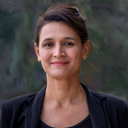Lonneke van der Plas
Short Biography
Since 2021, Lonneke van der Plas is leading the Computation, Cognition & Language group at Idiap in Martigny. She is associate professor in affiliation with the University of Malta, where she has been lecturing since 2014. Before that, she was junior professor at the Institute for Natural Language Processing (IMS), University of Stuttgart, where she lead a research group in the framework of the SFB 732. She did a post-doc (maître-assistante) at the University of Geneva working in the field of cross-lingual transfer of semantic role labelling as part of the CLASSiC project.
Education
Lonneke earned her PhD from the University of Groningen (Department of Humanities Computing), where she worked on vector-based word representations for medical question answering. Before that she did the M.Phil Computer Speech and Language Processing at the University of Cambridge. The M.Phil has now been renamed into Computer Speech, Text and Internet Technology.
Research interests
Cross-lingual natural language processing, computational semantics, computational creativity, compound processing, distributional semantics.Visiting Scholarships
Lonneke was a DSI fellow at the University of Zurich from October 2019-January 2020.
She was a Erasmus Mundus LCT visiting scholar at the Shanghai Jiao Tong University (SJTU) and at the School of Computing and Information Systems of the University of Melbourne in June, July 2016.
She was a visiting academic at the Division of Information and Communication Sciences of Macquarie University, Sydney from January till March 2007.
Main projects
NCCR Evolving Language (Second phase, SNSF 2024-2028, PI)
The Swiss National Centre of Competence in Research (NCCR) Evolving Langugae is a nationwide interdisciplinary research consortium brining together research groups from the humanities, from langugae and computer science, the social sciences and the natural sciences.
C-LING (Towards Creative systems with LINGuistic modelling, SNSF 2022-2026, sole PI)
This project aims to create computational models of language to study creative abilities in humans, such as creative thinking, and creative problem solving.
FactCheck (Hasler Foundation, co-PI with Sébastien Marcel)
IN this project we will create a dataset and implement methods for multi-modal collaborative human-centred fact-checking.
SEM24 (Multilingual NLP for HR tech, Innosuisse 2023-2025, main PI)
This project is in collaboration with researchers at the EHL Hospitality Business School, and the company ARCA24. The aim is to support candidate selection tools with easy expansio to new languages and domains and to include soft skills and person-organisation fit, while mitigating model bias.
LT-BRIDGE H2020-WIDESPREAD (2021–2023, main applicant/coordinator)
Bridging the technology gap: Integrating Malta into European Research and Innovation efforts for AI-based language technologies.
UPSKILLS (UPgrading the SKIlls of Linguistics and Language Students)
EU Erasmus+ (2021-2023, main applicant/coordinator)
The central goal of this project is to tackle the identified skills gaps and mismatches in linguistics and language students through supporting the development of innovative materials that better meet the learning outcomes needed in the current job market, and this in collaboration with language technology companies.
MUFINS (NLP-Driven, MUltilingual FInancial News and content Search)
Malta Enterprise Research grant (2020-2022, co-applicant)
This project aims to investigate transfer learning techniques to resolve a variety of NLP tasks in multiple languages, within the financial
and news domains. This project is led in collaboration with CityFalcon Trading Ltd.
MASRI (Maltese Automatic Speech Recognition)
UM Research Fund (2018-2020, co-applicant)
This project aims to build a automatic speech recogniser for Maltese, a low-resource language, using various bootstrapping approaches.
SFB 732 project D11: A crosslingual approach to the analysis of compound nouns
DFG (2014-2018, main applicant)
This project proposes a compositional approach to noun-noun (N-N) compound analysis with an interdependent three-level model that comprises compound splitting, capturing the meaning of the components and the covert relation that holds between them. We used multi-lingual data throughout the project, in analysis and evaluation, and followed a language-independent approach, using automatic, knowledge-lean, data-driven methods.
Current PhD students:
Vincent Jung
Molly Rose Petersen
Mete Ismayilzada
PhD student in NCCR Evolving Language to join in September/October
Current post-docs:
Laura Vásquez
Postdoc on factchecking to join from August 2024
Previous post-docs:
Marc Tanti (co-supervised with Albert Gatt) Previous PhD students: Stefan Müller Patrick Ziering Rebecca Vella Muscat (in co-supervision with Stavros Assimakopoulos)
Publications
List of publications
